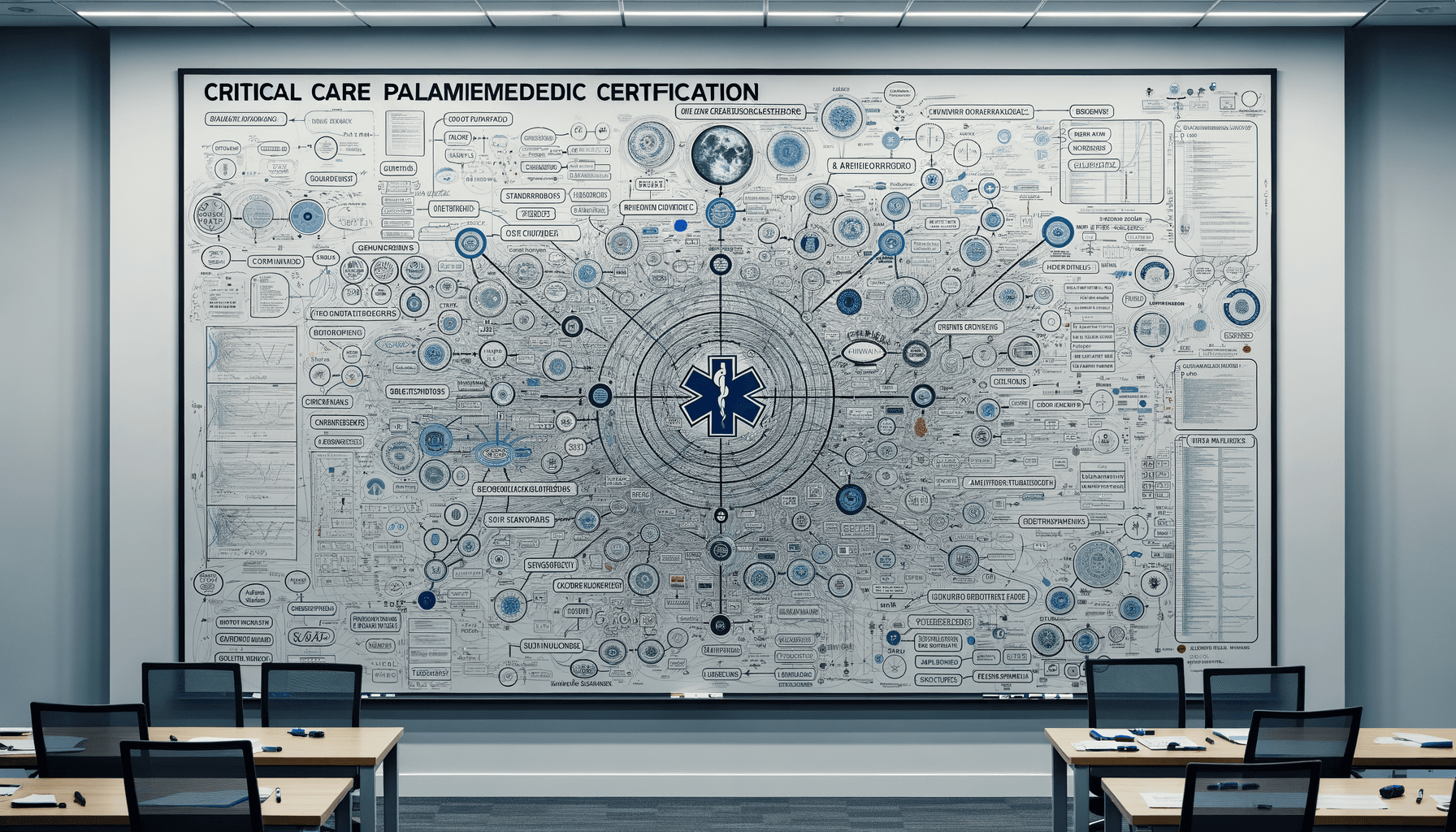
The Critical Care Paramedic Certification (CCP-C) is designed for paramedics who aspire to elevate their proficiency in critical care transport. This certification assesses the comprehensive knowledge and advanced skills necessary in the specialized field of critical care paramedicine. The CCP-C exam is not merely an evaluation of basic paramedic skills but focuses on the candidate’s ability to handle complex patient conditions and critical care transport scenarios. A successful candidate must demonstrate a deep understanding of advanced life support, patient assessment, pathophysiology, and management of critical conditions across various patient demographics.
The CCP-C examination consists of a total of 135 questions, with 125 being graded and 10 serving as beta questions that help refine future exams but do not contribute to the candidate's score. Candidates are allotted 2.5 hours to navigate through these multiple-choice questions, which cover a broad spectrum of critical care topics. These include, but are not limited to, advanced cardiac life support (ACLS), pediatric advanced life support (PALS), neonatal resuscitation (NALS), and pre-hospital trauma life support (ITLS/PHTLS). It is crucial for candidates to prepare extensively across all these areas, as the exam aims to validate the paramedic’s competency in providing high-level care in pre-hospital, inter-hospital, and hospital settings.
To adequately prepare for the CCP-C exam, candidates should engage in rigorous study and practical application of critical care concepts. Comprehensive review courses specifically tailored for the CCP-C exam can be immensely beneficial. These courses often provide detailed insights into the exam format and core content areas. Additionally, hands-on experience in critical care settings is invaluable. Simulated practice scenarios involving critical patient care can enhance a candidate’s ability to apply theoretical knowledge in real-world situations. Engaging with current literature on advanced paramedical practices and participating in relevant workshops and seminars will also fortify a candidate's readiness for this challenging certification process.
The CCP-C exam tests a paramedic's expertise in managing complex airway situations and ventilation strategies. Candidates must demonstrate knowledge of advanced airway interventions, mechanical ventilation settings, and the management of ventilated patients during transport. This includes understanding the use of various airway tools like endotracheal tubes, laryngeal masks, and cricothyrotomy kits.
This section covers the assessment and management of acute cardiovascular conditions. Candidates are expected to be proficient in interpreting ECGs, managing arrhythmias, and understanding pharmacological interventions. The syllabus also includes the management of shock states, cardiac arrest scenarios, and the application of advanced life support protocols.
Candidates must show a deep understanding of medical emergencies that require critical care transport. This includes the recognition and treatment of sepsis, diabetic emergencies, acute respiratory distress syndrome (ARDS), and neurological emergencies such as stroke and seizures.
The trauma component evaluates knowledge in the systematic approach to trauma care based on current guidelines. Topics include the management of blunt and penetrating injuries, traumatic brain injury, spinal cord injury, and rapid assessment techniques for multi-system trauma patients.
This part of the syllabus addresses patient care considerations that are unique to specific populations or conditions. Topics include obstetrical emergencies, pediatric emergencies, geriatric issues, and patients with significant environmental exposure such as hypothermia or heat stroke.
Operational knowledge is crucial for critical care paramedics. This section includes safe transport logistics, understanding of flight physiology for air transports, scene management with multiple agencies, and knowledge of legal issues pertaining to critical care transport.
By covering these key areas, the CCP-C certification ensures that paramedics are equipped with the necessary skills and knowledge to provide advanced critical care in a variety of challenging environments.
The CCP-C exam is meticulously designed to assess the proficiency of experienced paramedics in critical care settings. The examination consists of a total of 135 questions. Among these, 125 are graded questions that contribute to the final score, while the remaining 10 serve as beta questions used to fine-tune the exam for future test takers. Candidates are allotted 2.5 hours to navigate through the exam.
The CCP-C exam incorporates a variety of question types, which primarily include multiple-choice questions. These questions are crafted to evaluate a candidate's practical knowledge and theoretical understanding of advanced life support, patient assessment, and critical care procedures. The questions are scenario-based, often presenting complex patient cases requiring critical thinking and swift decision-making.
To pass the CCP-C exam, candidates must achieve a score that meets or exceeds the passing standard set by the certifying board. This standard is periodically reviewed and adjusted to ensure it accurately reflects the current level of competency required in critical care paramedicine.
If a candidate does not pass the CCP-C exam on their first attempt, they are allowed to retake the exam. However, there is a mandatory waiting period before the retake can be scheduled. This interval is intended to give candidates ample time to improve their knowledge and skills based on their performance in the initial exam. Further details regarding the specific waiting period and retake fees can be obtained from the certifying authority's official guidelines.

The CCP-C exam consists of 135 questions, including 110 scored items and 25 unscored pilot items. Candidates are given 2.5 hours to complete it. The focus is on testing the knowledge of master-level paramedics who are experienced in critical care environments, including pre-hospital, inter-hospital, and hospital settings.
It's crucial to review the detailed content outline provided by the International Board of Specialty Certification (IBSC). This outline will guide you on the specific topics covered in the exam, ensuring you focus your studies on relevant areas.
Participating in study groups or online forums can provide support and additional insights into complex topics. Discussions with peers can also help clarify difficult concepts and offer new perspectives on the material.
Ensure that you are up-to-date with the latest protocols and advancements in critical care paramedicine. Reading current journals, attending seminars, and participating in related training sessions are essential for maintaining a high level of preparedness.
By following these guidelines, candidates can enhance their readiness for the CCP-C examination, focusing on both theoretical knowledge and practical skills essential for success in critical care paramedicine.

Practicing exam questions for the CCP-C certification helps candidates become familiar with the specific format and style of the exam. This includes understanding the types of questions asked, such as multiple-choice or scenario-based questions, and the distribution of topics covered. Familiarity reduces anxiety and increases confidence, enabling candidates to manage their exam time more effectively.
Regular practice with exam questions allows candidates to identify areas where their knowledge may be lacking. This targeted identification helps in focusing study efforts more efficiently, ensuring that all necessary topics are covered thoroughly. By pinpointing weaknesses early, candidates can seek additional resources or clarification on complex topics.
Answering practice questions is an active form of learning that reinforces understanding and retention of information. Each question answered correctly confirms knowledge, while those answered incorrectly provide an opportunity for learning. This process of testing and immediate feedback is crucial in solidifying knowledge and skills needed for critical care environments.
Critical care paramedicine requires not only theoretical knowledge but also the ability to apply this knowledge in practical, often high-pressure situations. Practice questions often simulate real-life scenarios that a critical care paramedic might face, enhancing decision-making skills and the ability to apply theoretical knowledge practically.
Consistent practice with exam questions builds endurance and readiness for the actual CCP-C examination. As candidates become accustomed to the rigor and length of the test through practice sessions, they develop stamina and improve their overall test-taking strategy, including time management and question analysis techniques.
By integrating these practices into their preparation plan, candidates enhance their chances of succeeding at the CCP-C certification exam, thereby advancing their capabilities as critical care paramedics.
Main message: Find exam practice questions on exammaker.ai at exammaker.ai.
Many books are tailored specifically towards preparing candidates for the CCP-C exam. One notable resource is the "FP-C / CFRN or CCP-C Exam Prep and Advanced Practice Update Book." This manual not only provides comprehensive reviews of critical care concepts but also includes practice exam questions that are crucial for effective study.
Websites like exammaker.ai offer a wide range of practice questions designed specifically for the CCP-C certification. These platforms typically feature a database of questions that mimic the format and difficulty of the actual exam.
Consider enrolling in an online review course such as the FP-C, CCP-C, CFRN®, CTRN® Online Review Course. These courses often include a series of practice questions and mock exams to help consolidate your knowledge and test-taking skills.
Online forums and social media groups can be invaluable resources. Members often share their own experiences, study tips, and sometimes even custom practice questions.
Check with local colleges or training centers that offer paramedic training. They might have specific resources for CCP-C exam preparation, including practice tests.
Organizations like the International Board of Specialty Certification (IBSC) provide resources and links to approved study materials and practice exams. Visit their website to explore available resources.
By using these varied resources, you can enhance your preparation for the CCP-C examination through comprehensive practice and review.
The CCP-C exam includes 135 questions, of which 110 are scored and 25 are unscored pilot items. You will have 2.5 hours to complete it. Knowing this can help you manage your time effectively during the test.
Start by reviewing the detailed content outline provided by the IBSC. This outline will give you a clear idea of what subjects you need to study and ensure that you cover all necessary topics.
Identify your weak areas early in your preparation. Spend extra time reinforcing these topics to ensure a well-rounded understanding across all critical care paramedic competencies.
Taking practice tests can greatly aid in understanding the format and types of questions asked on the CCP-C exam. This approach also helps in identifying knowledge gaps.
Mimic the actual exam conditions by timing your practice sessions. This will help you gauge how much time to allocate per question and improve your time management skills during the actual exam.
Ensure that you study from recommended textbooks that cover advanced paramedic practices, critical care procedures, and protocols.
Consider enrolling in specialized courses or workshops that focus on critical care transport medicine. These can provide valuable insights and hands-on experience.
Joining study groups can be beneficial. Discussions with peers can clarify doubts and provide new insights into complex topics.
Make sure to arrive at the test center early to avoid any last-minute stress and to settle in comfortably before the exam starts.
Take the time to carefully read each question and its options before answering, ensuring that you understand what is being asked.
Stay informed about the latest practices in critical care transport medicine even after your exam preparation, as this field is constantly evolving.
The CCP-C examination is designed to evaluate a candidate's knowledge and skills in critical care paramedicine. This practice set aims to mirror the types of questions you might encounter on the actual exam, covering key topics such as patient assessment, pharmacology, and airway management.
A 54-year-old male presents with chest pain and shortness of breath. He is pale, diaphoretic, and has a history of hypertension. What should be the initial step in managing this patient?
Correct Answer: 4. All of the above
Which medication is indicated for the immediate treatment of ventricular fibrillation?
Correct Answer: 2. Amiodarone
In a patient with suspected spinal injury, which method is preferred for securing the airway?
Correct Answer: 3. Orotracheal intubation using manual inline stabilization
Identify the condition characterized by a sudden collapse of lung tissue affecting part or all of a lung:
Correct Answer: 1. Pneumothorax
Which ECG finding is most indicative of an acute myocardial infarction?
Correct Answer: 2. ST-segment elevation
Each correct answer provided above is based on current critical care protocols and best practices in emergency medicine, ensuring that candidates are well-prepared not only for the CCP-C exam but also for real-life scenarios in critical care paramedicine.
These questions are designed to challenge and refine your understanding, ensuring comprehensive preparation for your certification exam.
The Certified Critical Care Paramedic (CCP-C) examination is designed for master-level paramedics who have experience in critical care transport in various environments like pre-hospital, inter-hospital, and hospital settings. The exam consists of 135 questions, of which 110 are scored and 25 are unscored pilot items. Candidates are allotted 2.5 hours to complete the test. The focus is on assessing the candidate’s mastery of advanced critical care transport medicine.
The passing score for the CCP-C exam is set by a designated IBSC Subspecialty Board, Test Committee, or Subject Matter Expert Group using the modified-Angoff method. This method ensures that the score reflects a specified level of mastery in the specialty area rather than a fixed percentage pass rate. The exam results are reported only as pass or fail to emphasize certification as the primary goal.
Candidates who do not pass will receive a diagnostic report highlighting their strengths and weaknesses in specific subject areas. This report serves to aid in preparation should the candidate choose to retake the exam.
No, numeric scores are not provided to those who pass the CCP-C exam. This policy is in place to prevent misuse of scores for purposes other than certification, such as hiring or promotion decisions, which are not the intended use of IBSC exams.
Candidates should prepare by reviewing a detailed content outline provided by IBSC, which covers all relevant topics within critical care transport medicine. It is crucial to understand that the exam tests overall knowledge applicable to various transport environments and not just scenarios specific to one’s current practice.
The CCP-C exam can be taken at over 800 testing centers across the United States and nearly 100 international locations. Candidates must register online and will receive an eligibility number along with scheduling information via email within 3-5 business days.
For more details on registration, testing locations, and fees, candidates should visit the official IBSC website or contact their support center directly.